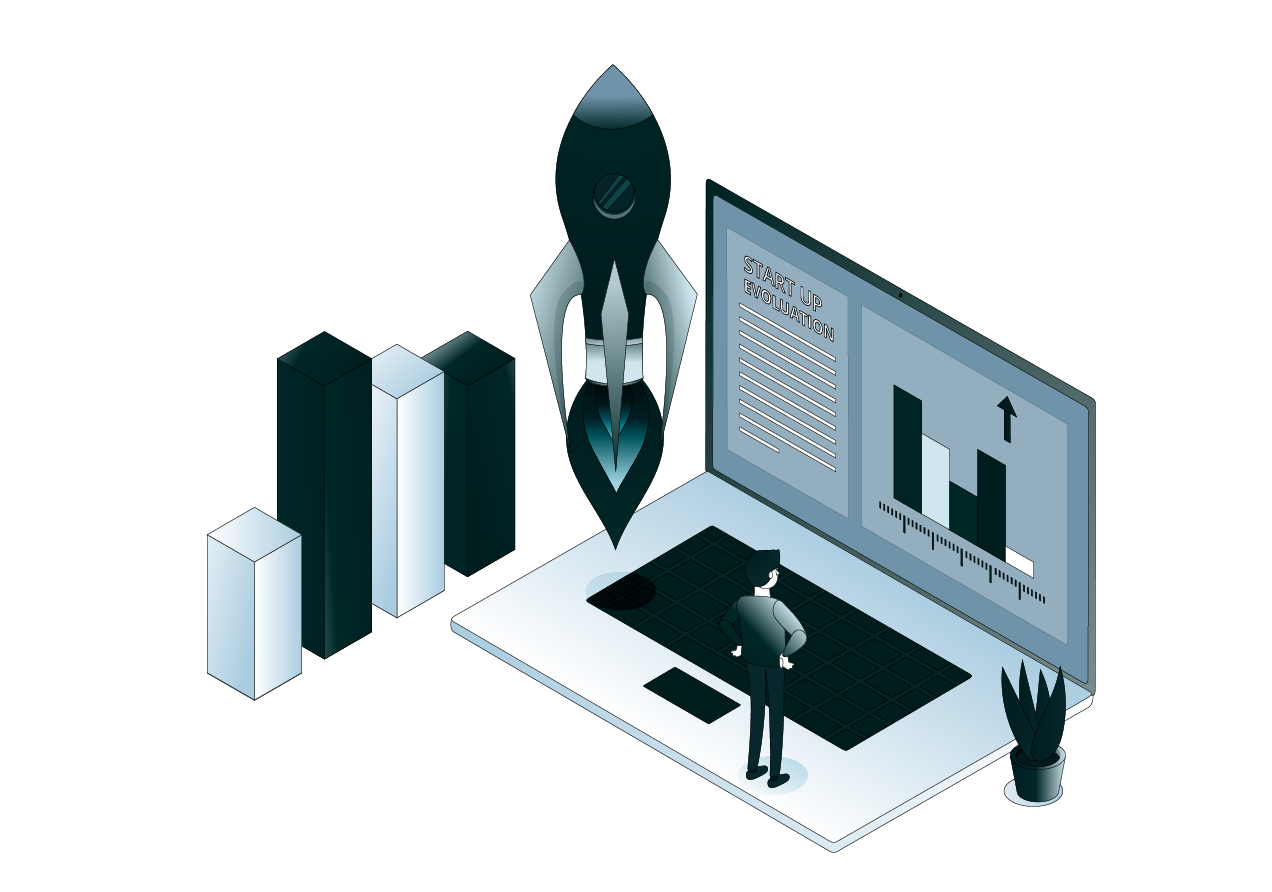Kickstart Your Business with Ruby on Rails B2B Solutions for Efficiency and Scalability
Given the developing prevalence of online businesses nowadays, are you looking to develop Ruby on Rails B2B solutions? Developing a web application is irrefutably crucial for the development of organizations. A versatile web application is fundamental for any kind of business, new or established.
One famous framework for developing web applications that is especially good at building adaptable and reliable applications is Ruby on Rails. Prominent international associations like Shopify, GitHub, and Airbnb rely upon it, exhibiting its adequacy. Eminently, Ruby on Rails was likewise utilized in the development of Twitter’s original framework.

Flexibility isn’t simply a catchphrase while utilizing Ruby on Rails; a genuine advantage progresses your organization. Ruby on Rails’ versatility makes it remarkable. Your digital infrastructure can develop with your organization, making sure that regardless of what lies under the surface, your frameworks stay responsive and strong. A streamlined, agile platform that grows with you can replace cumbersome, antiquated solutions that break under pressure.
The strength and flexibility of RoR B2B solutions are joined powerfully. These solutions guarantee that every action makes a significant contribution to your overall objectives that lines up with your business objectives, as opposed to just addressing individual challenges. Become one of the organizations that are using Ruby on Rails B2B solutions. A guide for effectiveness, scalability, and long-term success is given by Ruby on Rails. Now is the moment to grow your company to new heights, let Ruby on Rails be your guide.
The Dusty Trails Where Ruby on Rails Unleashes the Frontier’s Finest E-Commerce Experiences
Ruby on Rails e-commerce platforms like Spree Commerce, BigCommerce, Solidus, and Shopify Plus are fundamental tools for organizations looking to build a strong online presence. These platforms give a scope of elements planned to further develop consumer satisfaction, expedite processes, and spur revenue growth.
Solidus, prestigious for its flexibility and open-source design, empowers organizations to customize their web-based storefronts to meet specific prerequisites, ensuring a smooth and customized purchasing experience. It is ideal for organizations with various growth rates because of its strong architecture, which works with adaptability. Prominent SaaS platform BigCommerce gives an extensive toolkit to organizations of all kinds. With its easy-to-use interface and strong marketing and analytics features, organizations can amplify the capability of their online storefronts and increase revenue.
Scalability is combined with sophisticated features like multi-channel selling, customizable checkout processes, and automation tools in Shopify Plus, an enterprise-level platform. With the help of this platform, organizations can successfully scale their activities and give exceptional client experiences. An open-source platform called Spree Commerce offers organizations a scalable and adaptable solution. Organizations can add or change highlights depending on the situation because of its modular architecture, which guarantees adaptability and versatility. Organizations can increase operational proficiency, create new growth opportunities, and give better client encounters by using these e-commerce platforms. RoR B2B solutions empower organizations to prosper through customization, versatility, and high-level features.
Strategies and Secrets for Crafting a Scalable B2B Web App with Ruby on Rails Grit
The foundation of developing a scalable B2B web application with Ruby on Rails is careful planning and strategic design. Start by performing an intensive examination of the necessities of your clients, industry trends, and rival products. A thorough project roadmap with timetables, milestones, and resource allocation is based on this research. Give the need for modular architecture in the planning and design stage to empower future versatility. Utilize the MVC framework in Ruby on Rails B2B solutions for more proficient development and maintenance. To guarantee adaptability and extensibility in the seamless integration of third-party services, use RESTful APIs.

Iterative testing, consistent feedback loops, and agile development methodologies are completely utilized in the application’s development. Work intimately with stakeholders to refine highlights and functionalities in response to market demands, user feedback, and new technological developments. Utilize infrastructure based on the cloud for scalability, dependability, and performance optimization. Caching techniques for faster response times, database sharding for horizontal scaling, and asynchronous processing for laborious operations are important parts that further develop versatility. Put strong security measures in place to safeguard delicate data and guarantee regulatory compliance, such as SSL encryption, access controls, and data backups.
Continuous integration/continuous deployment (CI/CD) pipelines, version control, and automation should be the principal focal points of organization procedures. For versatile, fault-tolerant deployments, utilize orchestration platforms like Kubernetes and containerization technologies like Docker. To track down bottlenecks and streamline framework assets for the greatest versatility and client experience, do load testing and performance monitoring.
Donning Ruby on Rails’ Best Practices for Building Top-Notch B2B Software Solutions
Developing business-to-business software using RoR B2B solutions requires a methodical approach to guarantee success. The following five best practices are essential to complete this task to the highest standard.
First and foremost, it is crucial to test applications thoroughly. Put into practice thorough test suites that include system, integration, and unit tests. Robust testing is made easier by automated testing frameworks like RSpec and Capybara, which reduce post-deployment problems and guarantee software reliability. Second, give security a top priority when developing new software. Use industry-recognized procedures like frequent security audits, secure authentication methods, and data encryption. Following security procedures protects against potential threats and increases customer trust.
Thirdly, prioritize parameter validation to strengthen the resilience of the application against errors and malicious inputs. Use input validation techniques to verify user inputs at the frontend and backend layers, avoiding common security threats like SQL injection and cross-site scripting (XSS) attacks. Fourth, accept the idea that convention should always take precedence over configuration. Use the predefined structures and conventions of Ruby on Rails to expedite development, improve the readability of code, and foster consistency throughout the application. Following accepted practices cuts down on development time and maintenance costs.
Finally, create strong domain objects to hold domain-specific rules and business logic. Make use of the principles of object-oriented design to develop modular, reusable components that aid in maintainability and scaling. Robust domain objects facilitate code reusability and organization, which in turn fosters long-term flexibility and agility. Businesses can use Ruby on Rails to create scalable, secure, and reliable B2B software solutions by following these best practices. Building successful B2B software starts with investing in rigorous testing, strict security measures, efficient parameter validation, convention-driven development, and strong domain modeling.
Exploring the Vast Horizons of Scalability in Business Development with Ruby on Rails
Development utilizing RoR B2B solutions has many advantages for organizations looking for scalability. The fundamental benefit is RoR’s strong framework, which takes into consideration effective scalability with its modular design and large library. Since this framework makes development processes more proficient, organizations can extend and adjust their applications more rapidly as their user base grows.

RoR development’s MVC (Model-View-Controller) architecture, which divides the layers of logic, presentation, and data, supports scalability. Because of this division, developers can extend or change individual parts without influencing the framework as a whole, which further develops versatility. Along these lines, organizations can just scale their applications to add greater usefulness, improve execution, or handle higher client loads without encountering any difficult issues.
Besides, RoR’s abundance of built-in tools and emphasis on convention over configuration improve the development and maintenance of scalable applications. Plugins, gems, and libraries that are as of now accessible can be utilized by developers to further develop functionality and more effectively handle scalability issues. This ensures a serious level of versatility and reliability while cutting down on development time and costs.
Besides, RoR’s alignment with scalability requirements is upgraded by its help for support for agile development practices. Organizations can scale and further develop their applications iteratively because of changing market demands and user feedback. This iterative process assists organizations with persistently enhancing and improving their applications for execution and versatility, while likewise eliminating time-to-market.
Since Ruby on Rails development offers a solid framework, modular architecture, a plethora of libraries, and support for agile practices, it presents a huge versatility advantage to organizations. Taking on Ruby on Rails B2B solutions can empower organizations to give remarkable client experiences, scale their applications successfully, and conform to evolving prerequisites.
Pattem Digital’s Sturdy and Reliable Ruby On Rails B2B Wagon Train
For several important reasons, our Ruby on Rails web development company succeeds at giving phenomenal B2B solutions. Most importantly, our team is composed of seasoned RoR developers who have broad information on building reliable, scalable applications that are especially appropriate for B2B settings. Second, to ensure speedy and efficient solution delivery, we stick to industry best practices and utilize RoR’s intense highlights like MVC architecture, large libraries, and agile development methodologies. Furthermore, our organization puts a high worth on participation, clear communication, and comprehension of the needs and goals of our clients’ organizations. Accordingly, we can make specific B2B solutions that outperform assumptions and give businesses effective, scalable, and future-ready applications that spur expansion and success.





